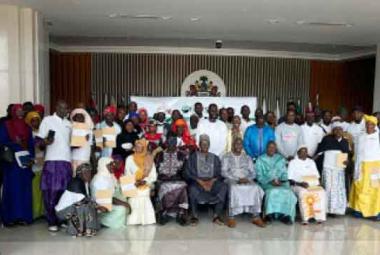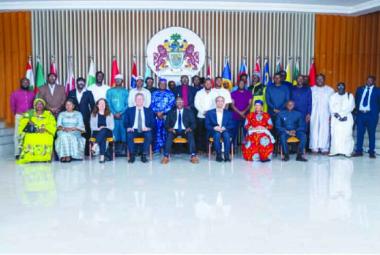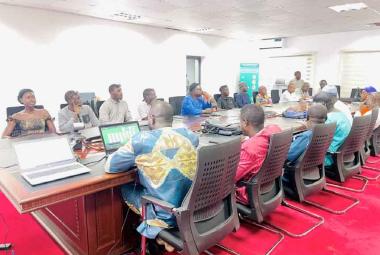By Awa Sowe
The National Fertilizer Policy is a confirmation of Government’s commitment to address low productivity associated with soil infertility and soil nutrient. In response to the low adoption of improved inputs, The Gambia Government has pursued various fertilizer policies and programmes. These initiatives include state-controlled procurement and distribution systems.
The International Labour Organization (ILO) estimates Gambia’s agriculture sector provided 27.1 percent of total employment in the country.
In general, more than two-thirds of Gambians reside in rural areas and derive their livelihoods from agriculture and related activities. Therefore, the sector is a prime area for investment to achieve poverty reduction as stated in the country’s Vision 2020 document.
It is Gambia Governments’s vision to transform agriculture into a productive, high value and market-oriented sector. The first Economic Development and Poverty Reduction Strategy which is guided by the revised targets of Vision 2020 aims to hasten the pace of economic transformation and poverty reduction by accelerating the pace of country’s attainment of food self-sufficiency.
It is along these strategic objective and vision, that the Department of Agriculture through the Agribusiness Service Unit, recently validated Gambia’s first National Fertilizer Policy. It aimed to enhance the country’s policy environment and to allow agricultural and fertilizer private sector development. The Policy is meant to support the implementation of a liberalized and competitive fertilizer sub-sector that leads to economic growth through the sustainable availability, access and efficient use of fertilizer.
To achieve this goal, the Gambia has earlier published the ECOWAS fertilizer regulation which relates to quality control of fertilizer in the National Gazette in October 2016.
The Deputy Permanent Secretary at the Ministry of Agriculture Mr Musa Houmma said the fertilizer policy will help farmers know how to use this important farm input, when to use it and the quantity to use. He said these are the three major issues farmers are faced with and it is what the policy will help them understand.
He added that the policy will provide a competitive and profitable fertilizer sector that ensures fertilizer access and affordability at farm gate in a timely manner creating acceptable fertilizer use by farmers for increased and sustainable agricultural productivity and farm incomes.
Mr Houmma further noted that the policy will help farmers understand fertilizer usage in the right portion.
Food and Agriculture Oorganisation (FAO) Assistant Representative for Programmes, Dr. Mustapha Ceesay, said the agriculture sector in Africa including The Gambia, continues to be characterised by low fertilizer use resulting in low crop yields. He said fertilizer usage must increase in Africa if the region is to meet its agricultural growth targets and poverty reduction goals, as well as environmental sustainability objectives.
According to Dr Ceesay, the validated National Fertilizer Policy was developed by the Government of The Gambia to support the transition to a well-inform fertilizer sector that is competitive and has the potential to trigger economic growth through sustainable availability, access, marketing, distribution and efficient use of fertilizer.
In conclusion, he said that the policy will contribute to increased agricultural productivity, economic returns and incomes through increased and sustainable access and use of fertilizers







